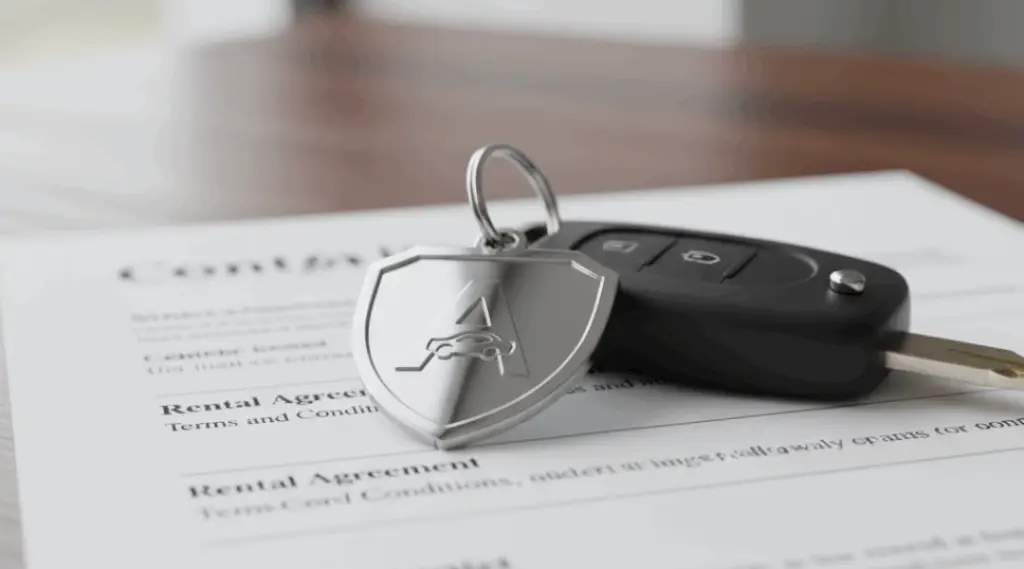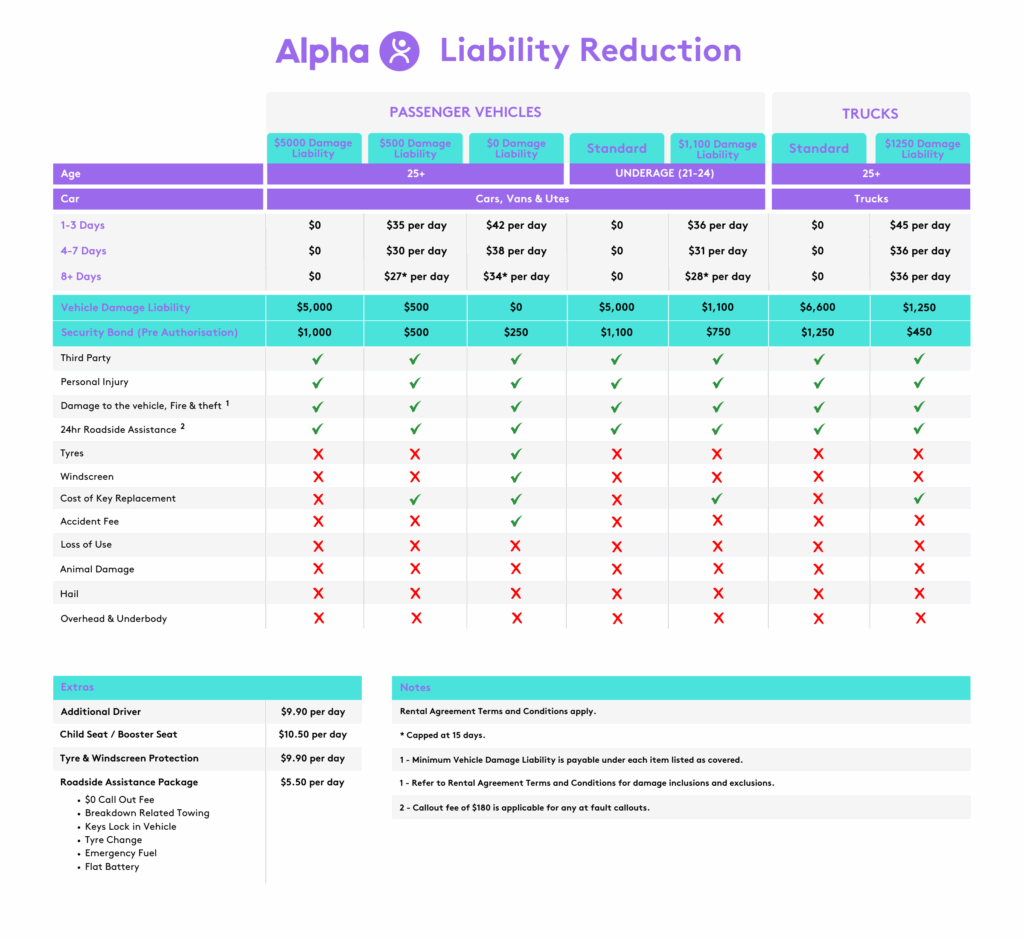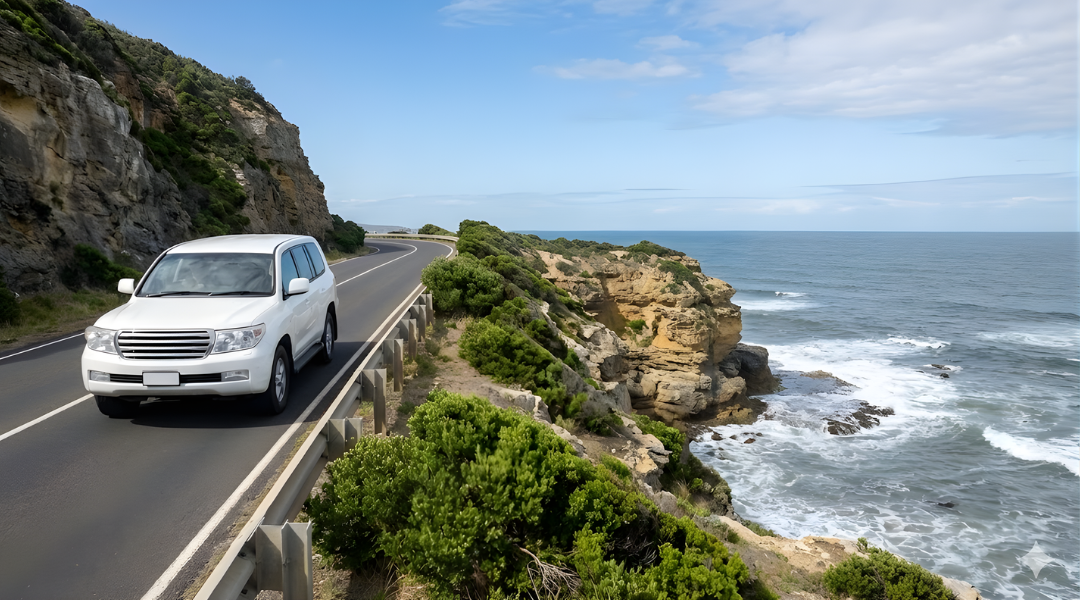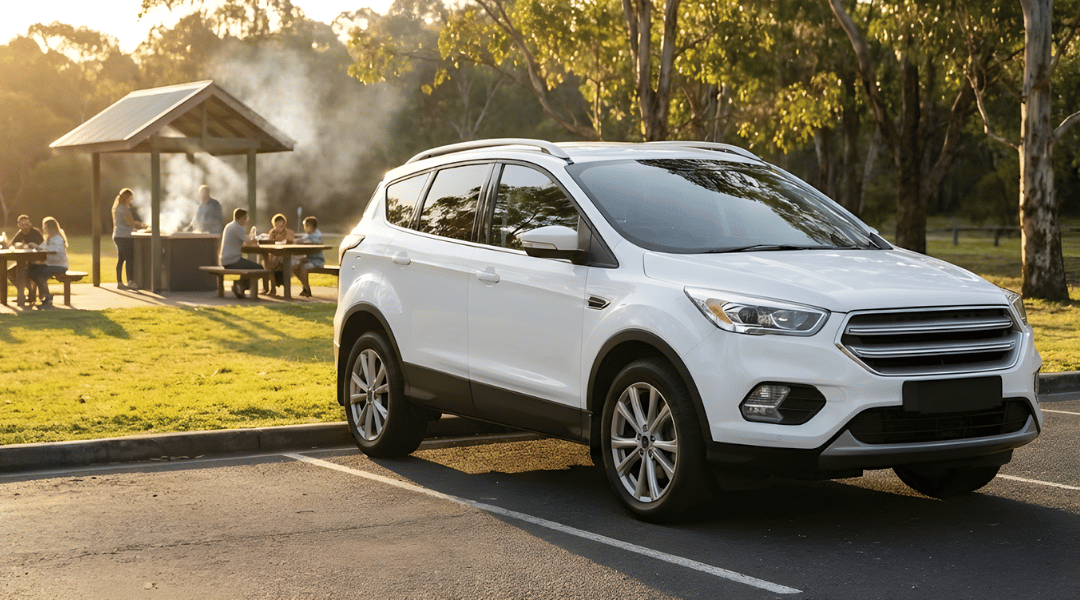Renting a car unlocks the freedom to explore, but it’s essential to understand car rental insurance to shield yourself from potential financial risks. This comprehensive guide will walk you through the basics of car rental insurance, highlight its importance, and clearly explain Alpha Car Hire’s flexible Liability Reduction options designed to give you complete peace of mind on Australian roads.
Understanding Car Rental Insurance Basics
What is Car Rental Insurance?
Car rental insurance protects you from financial liability if your rental vehicle is damaged or stolen. It typically covers damage to the rental car itself, theft, and often third-party liability for damage you might cause to other cars or property.

Why is it Important?
Adequate car rental insurance is crucial because it significantly reduces your financial exposure in the event of an accident, theft, or other unforeseen incidents. Without proper coverage, you could be liable for substantial costs, including:
- Vehicle Repair or Replacement: If you’re deemed responsible for an accident or the vehicle is stolen, you may be on the hook for the entire cost of repairs or replacing the vehicle.
- Third-Party Liability: If you cause damage to another vehicle or property or cause injury to a third party, you could face significant costs for repairs or compensation.
By choosing the right car rental insurance, you safeguard yourself from these potential financial risks, allowing for a worry-free travel experience.
Who Provides Car Rental Insurance?
Car rental insurance can come from several sources
Car Rental Companies
We offer our own comprehensive Liability Reduction options directly, which is often the most straightforward and clearest path to protection.
Credit Card Companies
Some credit cards provide rental car insurance as a perk, though coverage limits and terms can vary greatly.
Third-Party Insurance Providers
You can also purchase additional insurance from external providers.
Alpha Car Hire’s Liability Reduction Options: Drive with Confidence
At Alpha Car Hire, we believe in transparent and flexible protection. We offer three distinct levels of Liability Reduction to suit your needs and budget, clearly explained during your online booking process. Choosing one of these options significantly reduces your financial responsibility in case of an incident.

Key Features & What’s Covered
- Third-Party Liability: All Alpha Car Hire options include third-party liability, protecting you if you cause damage to another vehicle or property.
- Personal Injury: Essential cover for medical expenses and loss of income in case of an accident.
- Vehicle Damage & Theft: All options protect you from the cost of repairing or replacing the Alpha Car Hire vehicle in case of accidental damage or theft.
- Tyres & Windscreen: Our $0 Damage Liability option uniquely includes cover for damage to tyres and windscreens, offering maximum peace of mind.
- 24hr Roadside Assistance: Included as standard with all our rental agreements.
Important Notes on Damage Liability & Bond
- Damage Liability: This is the maximum amount you’d pay for damage to the Alpha Car Hire vehicle in an incident where you’re liable. Our options allow you to reduce this significantly from a standard amount (up to $5,000) down to as low as $0.
- Bond Pre-Authorisation: A bond amount is pre-authorised on your credit card at the start of the rental. This amount varies depending on the Liability Reduction option chosen, from $1,000 for $5,000 Damage Liability down to just $250 for $0 Damage Liability. This is a pre-authorisation, not a charge, and is released upon safe return of the vehicle.
- Underage Drivers (21-24): Specific daily rates apply for drivers aged 21-24. These are clearly outlined in the table above.
- Rental Agreement Terms and Conditions Apply: Always review the full rental agreement for comprehensive details on inclusions, exclusions, and specific terms.
Additional Coverage Options for Enhanced Protection
Beyond our core Liability Reduction packages, Alpha Car Hire offers additional extras to tailor your protection:
- Additional Driver: Just $9.90 per day to add another driver to your rental agreement.
- Child Seat / Booster Seat: Keep your little ones safe for just $10.50 per day.
- Tyre & Windscreen Protection (if not included): For those opting for $5000 or $500 Damage Liability, you can add specific tyre and windscreen cover for $9.90 per day.
- Roadside Assistance Package: While 24-hour Roadside Assistance is standard, our comprehensive package for $5.50 per day includes zero Call Out Fee, Breakdown Related Towing, Keys Lock in Vehicle, Flat Tyres, Emergency Fuel, and Flat Battery coverage (Note: a $180 callout fee is applicable for any at-fault callouts without this package).
Understanding Other Insurance Options
Your Own Car Insurance Policy
Before renting, check if your existing personal car insurance policy extends to rental vehicles. While some comprehensive policies may offer cover, be aware of potential gaps like limited coverage durations, specific exclusions for certain vehicle types, or higher excess amounts for rental car claims. Always consult your personal insurance provider directly for clarification.
Credit Card Rental Insurance
Many credit cards offer complimentary rental car insurance. To utilise this, you typically need to pay for the rental car entirely with that credit card and decline the rental company’s insurance. Be sure to understand their specific terms, conditions, coverage limitations (e.g., maximum period, vehicle exclusions), and geographic restrictions.
Tips for Choosing the Right Car Rental Insurance
- Assess Your Needs: Consider your trip type, the value of the vehicle you’re renting, and your personal risk tolerance.
- Understand Your Existing Cover: Check your personal car insurance and credit card benefits first.
- Review Alpha Car Hire’s Options: Compare our $5000, $500, and $0 Damage Liability options. Our comprehensive packages are designed for clarity and convenience.
- Read the Fine Print: Always review the full rental agreement and the terms of any insurance policy you choose. Don’t hesitate to ask our friendly staff any questions.
- Consider Additional Coverage: Think about extras like Tyre & Windscreen Protection or the full Roadside Assistance Package for maximum peace of mind.
Protect Yourself on the Road with Alpha Car Hire
Navigating car rental insurance can seem complex, but with Alpha Car Hire, we make it straightforward. By offering clear, flexible Liability Reduction options and transparent pricing, we empower you to choose the perfect level of protection for your journey. Experience the freedom of the open road with confidence, knowing you’re well protected.
Book your next adventure today and choose your ideal Liability Reduction option with Alpha Car Hire!




